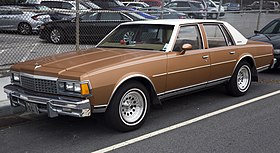Capriciousness
October 9, 2022 Chevrolet’s Caprice Classic was a popular sedan in the late 1970s. But the term “caprice,” applied to the business-judgment rule in the bankruptcy context, was less popular with the Fifth Circuit in In re J.C. Penney, No. 22-40371 (Oct. 6, 2022).
Chevrolet’s Caprice Classic was a popular sedan in the late 1970s. But the term “caprice,” applied to the business-judgment rule in the bankruptcy context, was less popular with the Fifth Circuit in In re J.C. Penney, No. 22-40371 (Oct. 6, 2022).
Specifically, a sublessee from J.C. Penney challenged that debtor’s decision to reject that sublease, noting irregularities in the relevant bidding process, and urging adoption a view of the business-judgment rule that would not defer to “the product of bad faith, or whim, or caprice.” The Court disagreed, observing:
The question is not whether the debtor’s decision reasonably protects the interests of other parties, but rather whether the decision “appears to enhance a debtor’s estate.” This distinction proves fatal to Klairmont’s claim, as bankruptcy, by definition, often adversely affects the interests of other parties. The long-standing purpose of allowing debtors to shed executory contracts is to afford trustees and assignees the opportunity to reject “property of an onerous or unprofitable character.” The correct inquiry under the business judgment standard is whether the debtor’s decision regarding executory contracts benefits the debtor, not whether the decision harms third parties.
No. 22-40371 (Oct. 6, 2022).